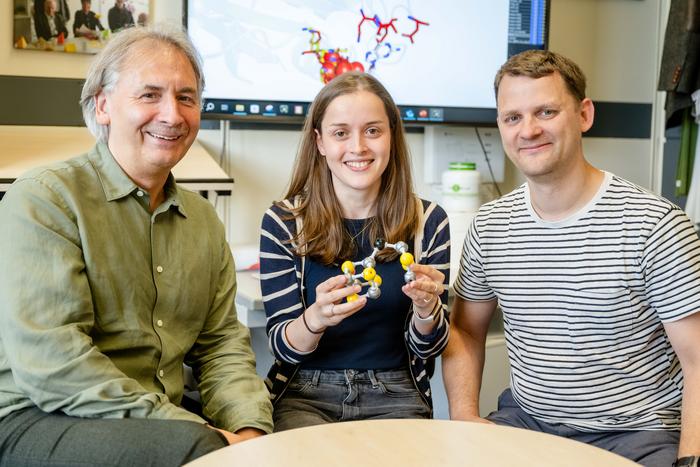Ligands on the cluster facilitate hydrogen production

Credit: RUB, Marquard
Ligands on the cluster facilitate hydrogen production
“Iron-sulphur ([FeS]) clusters are essential, widely distributed protein cofactors that perform a wide variety of functions in the cell,” explains lead author Rieke Haas from the Photobiotechnology research group headed by Professor Thomas Happe at Ruhr University Bochum. They are involved, for example, in catalyzing chemical reactions, transferring of electrons, sensing changing environmental conditions and synthesizing other complex metal cofactors.
The hydrogen-producing [FeFe] hydrogenases of algae also have an [FeS] cluster – a unique catalytic center. The fact that it facilitates the production of the green energy carrier hydrogen under mild reaction conditions makes it a key research priority for future-oriented energy production. “In addition to iron and sulphur atoms, its cofactor contains other ligands that make the conversion of hydrogen possible,” explains Rieke Haas. “This means that the biosynthesis of the cofactor requires a complex sequence of different synthesis steps in order to provide all the necessary components.” To to this, the organism needs a biosynthetic apparatus tailored to this process, which includes three enzymes that are responsible for the main synthesis steps. In particular, the role of the enzyme HydF, which is involved in the final assembly steps, has remained largely unexplained.
Which role do individual amino acids play?
The researchers used site-specific mutagenesis to gain new insights into how the cofactor precursor is integrated into the enzyme and how individual amino acids are involved in anchoring and synthesis. HydF plays a role during the synthesis of a ligand that is essential for the delivery of protons for hydrogen turnover. Using methods such as hydrogen production measurements and ATR-FTIR spectroscopy, the team gathered a more detailed understanding of how HydF works and, in particular, the role of specific amino acids. By providing insights into the previously unknown function of the maturation enzyme HydF, these new findings may help to shed light on the biosynthesis of the unique cofactor of [FeFe]-hydrogenases.
Journal
Journal of the American Chemical Society
Method of Research
Experimental study
Subject of Research
Cells
Article Title
A Conserved Binding Pocket in HydF is Essential for Biological Assembly and Coordination of the Diiron Site of [FeFe]-Hydrogenases
Article Publication Date
31-May-2024



